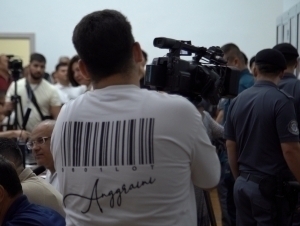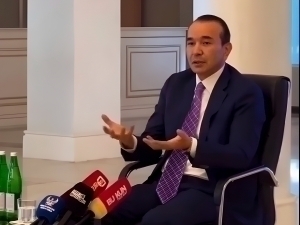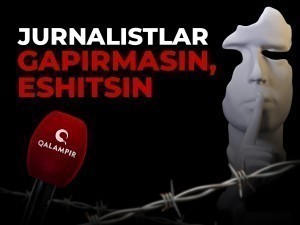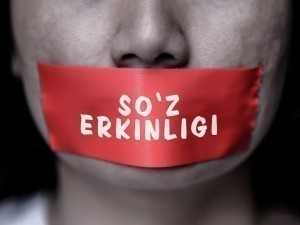“Challenges to Free Speech in Uzbekistan: The Impact of Internal Censorship and Uncriticizable Individuals”
Review
−
04 May 2023 16134 11 minutes
The 3rd of May is World Press Freedom Day, a day that has been dedicated to the discussion of freedom of speech since 1993. In all countries, especially those with a democratic system, freedom of speech and the inviolability of journalists are considered a top priority. The experience of developed countries has shown that the unconstrained activity of journalists is crucial for the development of a community.
The level of freedom of speech in a country can be analyzed by looking at the rankings compiled by the organization "Reporters Without Borders," which has become a tradition in recent years. It is concerning that, despite some liberalization and the lifting of several restrictions since 2017, freedom of speech has decreased by four points compared to last year. The country that ranked 133rd in 2022 has now dropped to 137th place.
This is not a desirable result, as the decrease in the level of freedom of speech in the country has a negative impact on its international image. It is crucial that steps are taken to address this issue and ensure that freedom of speech is protected.
Therefore, World Press Freedom Day is a reminder of the importance of freedom of speech and the need to protect the rights of journalists. It is vital for the development of a community and its international standing.
Has the shrinking space for free expression affected the work of journalists and bloggers? Are there any taboo topics for them? Have they ever had their journalistic material deleted under pressure? In general, how much do they value their freedom of speech? QALAMPIR.UZ asked these questions to well-known journalists and bloggers.
"The red lines are narrowing every year," laments Ilyas Safarov, a journalist. He rates the freedom of the press in Uzbekistan at only three out of ten points. "How many websites are relatively free in Uzbekistan today? Well, maybe two or three big ones. If we look at the general media landscape - TV channels, radio, newspapers and online publications- and analyze the issues they cover, almost 90-95 percent of the time they focus on trivial matters. Whether it's praising or criticizing minor things like women's quarrels, thefts, lack of transformers in the regions, asphalt issues, or disputes in "Open Budget" the media rarely covers topics of real importance. This situation is the same with TV channels."
When we analyze the media space, we find that only a handful of sites are critical, while the majority offer limited coverage on pressing issues. Even the critical sites have to navigate carefully within the boundaries of what is allowed, as the so-called "red lines" are narrowing year after year. Matters that could have been raised five years ago are now off-limits. In my opinion, the overall condition of the media can only be rated as a 3 out of 10. However, this is still a somewhat positive assessment.
This assessment was confirmed by the recent report from "Reporters Without Borders" organization, which showed a decline in Uzbekistan's ranking. Additionally, I came across a post by Shahnoza Soatova, where she pointed out that videos produced by "Ozodlik" were getting more views than programs by local publications.
This suggests that the information initiative, which was limited to Uzbekistan during 2016-2018, has now spread beyond the country's borders. People are starting to trust foreign publications again, which is a worrying trend. We have seen the consequences of people believing in foreign propaganda during the Russia-Ukraine war, where truth and falsehood became indistinguishable. Unfortunately, this process is beginning again, and those responsible for bringing it to this level will have to answer for the lost trust and the lost information initiative. In summary, the media space in Uzbekistan is still constrained, and critical voices are few and far between. The limited coverage of pressing issues, combined with a declining trust in local media, is leading people to rely on foreign sources of information. This is a dangerous trend, and those responsible for it must take accountability.
Throughout my career as a journalist, I've come across topics that are considered "untouchable", and their number seems to be increasing every year. Nevertheless, I strive to break down these barriers and push the boundaries of what's deemed acceptable.
However, there have been instances where I've had to delete prepared material due to pressure from higher-ups. Unfortunately, such situations are all too common.
One example was in 2019, when I had a piece on the Kashkadarya region erased under intense pressure. Despite this setback, the article was eventually republished thanks to public outcry. Regrettably, this incident is not unique.
Despite these challenges, I remain committed to my work. As Yulduz Olimova, a fellow journalist from the "Mening Yurtim" TV channel, put it, "Even if there is a riot, I will broadcast my video." I give my personal freedom of speech a rating of 7 out of 10. While I tackle many critical issues, I don't experience excessive pressure or censorship. None of my videos have been taken off the air, even when I've had to argue with the artistic council or go to the leaders to get my film aired.
I avoid tackling topics that I don't fully understand. When researching a subject, I analyze whether I've gathered sufficient information and understanding before presenting it. If I'm unsure or if there are flaws or gaps in my research, I won't cover the topic. Recently, I've focused on scrutinizing the implementation of the President's decisions and decrees in legislation, preparing critical-analytical materials that examine which office is responsible for their implementation and why the process has stalled. I'm passionate about fighting corruption and promoting transparency in government agencies.
Inobat Akhatova, a journalist from "Oyina.uz," rates the level of freedom of speech at 4 out of 10, considering that it is difficult to find a mass media outlet that is completely independent and free in Uzbekistan. Private media outlets that consider themselves independent are gradually coming under state control, and some publish materials that represent the interests of certain individuals. Therefore, to increase the level of freedom of speech, the number of independent mass media outlets should increase, and the state should interfere with the work of the press as little as possible. Disputes should be resolved through the court system.
While Akhatova has not personally experienced any restrictions, she has an internal censorship that prevents her from covering religious topics, which she considers to be ethically incorrect. She also notes that certain ministers and high government officials are considered "untouchable" topics.
Sarvar Bahadirov, a journalist from "My5" TV channel, rates the level of freedom of speech at 6 out of 10, recognizing that there are enough journalists who speak freely. However, he believes that more journalists need to have the courage to use the freedom of the press. The lack of such journalists is the reason for his assessment of the level of freedom of speech.
Bahadirov suggests that the level of freedom of the press will increase as the system of continuous improvement of personnel potential and qualifications is properly implemented, and more enthusiastic young people enter the field. He also acknowledges that there are taboo topics in the media of any country, but believes that the list of such topics will become shorter as journalists work on themselves.
Bahadirov has not personally experienced material being deleted based on calls, but records were unexpectedly deleted from an analytical report due to a technical error. Nevertheless, with the support of the management, they were able to air the report. He emphasizes the importance of a supportive management team in a newsroom to protect journalists from pressure and censorship.
Uzbekistan's progress in terms of freedom of speech has been hindered in the past two years. The media watchdog "Reporters Without Borders" recently released its ratings on media activities, placing Uzbekistan at 137th place out of 180 countries, with a score of 45.73 points. This suggests that the situation is not as favorable as we would hope.
In the past, the Uzbekistan government has paid special attention to such ratings and tried to improve its position in them. However, recent years have seen signs of indifference to the assessments of international organizations, with their reports being simply ignored. This trend is quite concerning.
As a blogger, I believe that the increased self-censorship among media workers and bloggers and the opening of a case against several social network activists indicate that Uzbekistan has taken a step back in terms of freedom of speech in the past two years.
I recall the suggestion from Kamil Allamjonov, who proposed that "a person in Uzbekistan should not be imprisoned for what they say." This proposal received widespread support. However, in the USA, where we currently are, the jailing of a journalist is unimaginable. Freedom of speech and journalistic integrity are highly valued in US politics.
This is not to say that journalists should not be held accountable. If a journalist violates the law and it is proven in court, they should pay a fine, but they should never be imprisoned. Some have proposed implementing this practice in Uzbekistan, but unfortunately, these proposals have remained on paper.
Personally, I avoid writing on national and religious topics, as they are "untouchable" in Uzbekistan. Writing on these topics can pose a significant threat to the Uzbek community. I used to write a lot about religion, but I learned from my own experience that it is like walking on a tightrope. If one takes a wrong step, they will inevitably fall into a cliff. Hence, it is better not to get involved in these topics if one lacks sufficient knowledge.
I am aware that some local journalists receive "calls" from various sources, but I have not personally encountered such cases. If I ever receive a call or threat, I will report it immediately. I have no intention of sitting quietly and complying with their demands. I would advise other media representatives who receive such "calls" to do the same.
"Social Pressure Hinders Freedom of Speech in Uzbekistan"
As a journalist at the Media Center of the Presidential Press Service, Aziza Kurbanova finds it challenging to evaluate the level of freedom of speech within the confines of the 10-point system. She believes that many factors influence the evaluation, and there is no perfect metric. However, based on her observations of the activities of electronic and private media, she rates the level of freedom of speech in Uzbekistan as a 7 out of 10. The mere fact that she is being asked to evaluate it indicates that there is room for independent thought and analysis in journalism and blogging.
However, Aziza Kurbanova admits that editors sometimes impose "taboos" on certain topics that journalists should avoid, and social pressure often restricts their ability to publish certain articles. Sometimes, when articles disappear, it is a signal to journalists to avoid certain topics.
Similarly, blogger Umid Gafurov rates the level of freedom of speech in Uzbekistan as a 5 out of 10, acknowledging that there is some level of freedom but not complete freedom. He admits that his posts have not been deleted from above, but he has had to delete them himself due to misrepresentation or emotional responses. Umid Gafurov believes that it is essential to be aware of the environment we live in, the people we live amongst, and create appropriate content accordingly. He advises against getting emotional and making sure to avoid personal attacks when posting on social media.
In conclusion, while there is some level of freedom of speech in Uzbekistan, the existence of taboos and social pressure means that the level of freedom is not complete. Both Aziza Kurbanova and Umid Gafurov agree that it is essential to be aware of the environment we live in and to act accordingly to avoid unwanted consequences.
Live
All




